 What are Funding Development Briefings?
What are Funding Development Briefings?
Funding Development Briefing 01/02/23 Spotlight on: KTPs – with Business Engagement and Knowledge Exchange Managers_re-scheduled!
 What are Funding Development Briefings?
What are Funding Development Briefings?
Latest research and knowledge exchange news at Bournemouth University
 What are Funding Development Briefings?
What are Funding Development Briefings?
Research England has published the results of the second Knowledge Exchange Framework (KEF).
Knowledge exchange is defined as a collaborative, creative endeavour that translates knowledge and research into impact in society and the economy. This, in turn, helps to inform research, enrich education and enhance professional practice.
BU’s performance in the KEF demonstrates a number of areas of strength – including our research partnerships, our work with business, and supporting local growth and regeneration.
About the KEF
The KEF is published annually to allow universities to better understand and improve their own performance in knowledge exchange, and provide businesses and other users with more information on the knowledge and expertise of universities.
Universities are measured across seven perspectives:
These areas have been measured through a combination of data collected through the Higher Education Business and Community Interaction (HE-BCI) survey and three narratives that summarised our institutional context, our contribution to local growth & regeneration and our public & community engagement.
In recognition of the fact that universities have different areas of expertise and work in regions with different needs, all universities in England have been placed into 7 different clusters according to their expertise, size and research activity.
The results are shared in the form of dashboards on the KEF website, with BU placed in Cluster E alongside other large universities with a broad portfolio of research across all disciplines.
Our KEF results demonstrate the breadth of activity across all of these important perspectives.
BU’s performance
Our performance in the latest KEF highlights several areas of strength – including our research partnerships and our work with business. We work collaboratively with organisations locally, nationally and internationally to embed our research in practice and support economic growth and innovation.
For example, the Institute of Medical Imaging and Visualisation (IMIV) is delivering education and professional development programmes to help meet the needs of the local community, the NHS and industry, as well as current global medical imaging workforce demands. Facilities including a 3T MRI scanner are also facilitating joint research opportunities with NHS trusts, primary care, industry and academia – helping to improve health outcomes for the region.
Through our partnership with University Hospitals Dorset, we are working on collaborative research that can make a real difference to patients. This includes a current joint project to explore commercialising a medical device which uses smartphones to screen nerve function in patients at risk of peripheral neuropathy – a condition which affects 2.3 million people in the UK and can lead to loss of sensation in the fingers and toes.
We are also developing new areas of research that have the potential to support industry – such as ADDISONIC, which explores how ultrasonic fatigue testing can quickly and reliably predict how materials will perform and last. This has a range of commercial applications – from jet engines to medical devices – and could help to create more efficient manufacturing processes and reduce global waste.
We share our work, research and expertise through public engagement activities, such as our regular Café Scientifique events and our online public lecture series, which gives audiences around the world the opportunity to learn more about BU research.
Ian Jones, Head of External Engagement at BU, said: “It is good to see an assessment of our progress in knowledge exchange and the impact we’ve made through our work.
“A part of our vision as a university is to enrich society. Our knowledge exchange work takes the knowledge we create and looks to embed it in society, and I’m proud that our work embodies this vision.”
David Sweeney CBE, Executive Chair of Research England, said: “Knowledge exchange (KE) is integral to the mission and purpose of our universities, and its importance in contributing to societal and economic prosperity is strongly supported by the Government.
“Today’s new version of the Knowledge Exchange Framework takes further forward the vision and potential of KE activity, providing richer evidence to demonstrate universities’ strengths in different areas when set alongside their peers.”
For more information about the KEF, please visit: https://kef.ac.uk/
 If you are interested in working with local industry stakeholders, and don’t know how best to approach communication, please attend “The BU Protocol of academics engaging with business” on 18/10/17.
If you are interested in working with local industry stakeholders, and don’t know how best to approach communication, please attend “The BU Protocol of academics engaging with business” on 18/10/17.
BU has many partnerships and established relationships with local and national stakeholders. This short session, run by Ian Jones, Head Of Regional Community Partnerships within the Office of the Vice-Chancellor, will cover the route of communication and protocol for approaching and working with these stakeholders. Examples of best practice will be presented along with details on how to understand when institutional commitments are being made.
The intended learning outcomes of this session are:
You book through the link here. For any questions about how this course may be useful to you, please contact Ehren Milner (emilner@bournemouth.ac.uk)
If you are working with SMEs, you may know that Eurostars is a scheme which assists small businesses to access funding.
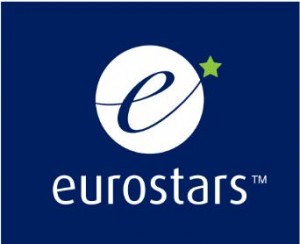 Eurostars supports international innovative projects led by research and development- performing small- and medium-sized enterprises (R&D-performing SMEs). With its bottom-up approach, Eurostars supports the development of rapidly marketable innovative products, processes and services that help improve the daily lives of people around the world. Eurostars has been carefully developed to meet the specific needs of SMEs. It is an ideal first step in international cooperation, enabling small businesses to combine and share expertise and benefit from working beyond national borders.
Eurostars supports international innovative projects led by research and development- performing small- and medium-sized enterprises (R&D-performing SMEs). With its bottom-up approach, Eurostars supports the development of rapidly marketable innovative products, processes and services that help improve the daily lives of people around the world. Eurostars has been carefully developed to meet the specific needs of SMEs. It is an ideal first step in international cooperation, enabling small businesses to combine and share expertise and benefit from working beyond national borders.
Eurostars is a joint programme between EUREKA and the European Commission, co-funded from the national budgets of 36 Eurostars Participating States and Partner Countries and by the European Union through Horizon 2020. In the 2014-2020 period it has a total public budget of €1.14 billion.
The role of SMEs for the economy has never been so important. Eurostars aims to bring increased value to the economy, higher growth and more job opportunities.
If you are working with a research-active business or have the opportunity to contact a potential industrial partner undertaking research, this site and the explanatory video found there, might just be the good news they have been waiting to hear!
N.B. As universities are not eligible to be funded through this competition in the UK, such partners must be in a position to self-fund. In addition, to be an eligible project, an SME has to do at least 50% of the work and no one partner or country can do more than 75% of the work. The university input, therefore, is limited and the partnering activity may be approved through benefits in kind, such as reputational, access to SME and relationship building, further joint funding strategy with the company, and academic experience of working with an industrial partner. These factors will need to be considered alongside the 0% fEC return.
Thinking of working with a applicant SME? Please contact Emily Cieciura and Jayne Codling in RKEO so that you can access our support and assistance.

….”Please can you keep me up to date with what’s happening in the area of knowledge exchange, impact, student research and research communications, and public engagement”….
The Knowledge Exchange and Impact Team (KEIT) within the Research and Knowledge Exchange Office will be working hard to make sure this new year resolution is well and truly kept !
To keep you up to date with what we are up to and how we are working ‘to bag a bargain’ read on to find out more. (Your diary or calendar is an essential item when reading this blog post to make sure you don’t miss out on key dates and deadlines.)
Interdisciplinary Research Week kicks off next week with a variety of events running from 25 until 29 January. It’s not too late to book your place onto many of the sessions.
These include the next inaugural lecture on 25th January in the EBC. This gives newly appointed professors the opportunity to share an insight into their field of work, research interests and achievements to date. Professor Lee Miles of BU’s Disaster Management Centre will be speaking on entrepreneurial resilience and disaster management.
“What will Marty McFly need in 25 years?” will take place on 26th and 27th January. We we are looking to prompt great debate in order to generate potential ideas for future projects as part of this sandpit event involving local businesses and BU staff and students. This will be facilitated by RKEO staff.
This year’s Bournemouth Research Chronicle is progressing well and will be published in the spring. It features a host of fascinating examples of interdisciplinary research from across the university. A publication not to be missed !
Knowledge Transfer Partnerships celebrated 40 years in 2015 and this national scheme continues to thrive as a great way to develop and engage business and university partnerships. The third cohort of training (at BU) started at the end of 2015 and will continue in 2016 with a number of academics across the university involved. To find out more about KTPs at BU contact Rachel Clarke.
Make sure you don’t run out of time as the call for proposals for the Festival of Learning are now open with a January 31st deadline. Click on this link to find out how to find out how to submit your proposal. A great opportunity to showcase your research to the public.
Love is in the air with the 14th and 29th February being key dates for those cupids out there ! If romance is in the air make sure you have the next Cafe Sci in your calendar – Tuesday 2nd February. Martin Graff will be speaking on the function of nonverbal behaviour in Human Courtship.
We’ve been working hard, reviewing the case studies submitted to the light touch impact review and have been meeting with UoA leaders and impact champions to go over feedback. There are some very promising cases under development and we are looking forward to sharing these in the future.
The area of student engagement moves into its third year having been established as part of the KEIT’s remit in 2014. Events to support this area of research include the research photo competition. Voting is now open ! Don’t miss out on your say. Click here to view all the entries on the research website and cast your vote or check out the Facebook page. All of the entries will be displayed in the Atrium Art Gallery during February and an awards ceremony will be held on the 4th February to announce the winners of the competition.
We received an overwhelming response to the Undergraduate Research Assistantship Programme (URA). Busy with recruitment there are a total of 46 vacancies across 36 projects to be filled. The first student induction has already taken place with many students starting on the programme this week. The next round of URA funding applications is due to open in February 2016 for summer research assistants.
If you want any further information on this blog post please feel free to contact a member of KEIT.
Look out for our next blog post published in February !

On Saturday 18 July (this Saturday), BU hosts its first ever Festival of Enterprise – a free event designed to give help and advice to startups, SMEs, established businesses, budding business-minded teenagers or anyone wanting to turn a business idea into a reality.
The Festival is open to anyone and takes place in the Student Centre between 10am and 3pm. There will be four ‘sofa’ sessions – Marketing, Finance, Cyber Security and Creativity – with industry experts giving their advice and taking questions, all aimed at engaging with and supporting local businesses.
There are other activities taking place too – business ‘speed dating’ sessions, an Enterprise Den specifically for college-aged teens and a keynote presentation from local entrepreneur Steve Bolton.
If you’d like more information, visit the Festival of Enterprise webpages. And most importantly, please spread the word. If you know of anyone (colleagues, friends, family) who may benefit from talking about business and enterprise in Dorset then send them along.

Join the Knowledge Transfer Network for a lunchtime webinar on 12th January 2015 to hear more about European funding opportunities and initiatives available to UK registered SME’s.
Although, universities cannot always bid directly to all calls (some must be submitted by the company), knowing what is available may enhance your conversations with business contacts.
Find out more about the Horizon 2020 SME instrument from the UK National Contact Point, Jane Watkins, who will also introduce the new ‘Fast Track to Innovation’ instrument to be launched in January 2015.
SME Instrument
Fast Track to Innovation Instrument
In addition, Graham Mobbs (European Operations Manager – Innovate UK) will discuss the Eurostars Initiative.
Eurostars
If you can’t wait until January please take a look at the dedicated UK SME Horizon 2020 and European Initiatives webpage: www.h2020uk.org/smes
The webinar will be on the 12th January 2015 at 12 noon. To book your place please register via the eventbrite link below:
http://ktnsmeeuropeanfunding.eventbrite.com
07515334818
 1. Small to Medium size businesses can apply for funded support to buy in consultancy expertise from university academics
1. Small to Medium size businesses can apply for funded support to buy in consultancy expertise from university academics
2. There are currently 2 different Innovation Voucher schemes which are run separately by the Technology Strategy Board (TSB) and Universities South West (USW)
3. With the USW Innovation Voucher you can receive up to 40% funded support for projects ranging from £3,000 – £10,000. (**Only organisations located in the South West can apply, excluding Cornwall)
4. TSB Innovation Voucher offers £5000 to businesses who are looking for support in the following sector areas:
Built Environment, Energy, Water & Waste and Agrifood
Also available to all industry sectors who specifically require expertise on ‘Open Data’ or ‘Cyber Security’
5. Applying for a voucher is easy! Both schemes require on-line applications where you will need to answer a few short questions about your idea, the impact it could have on your business and why you specifically need help from university academics.
For further information on Innovation Vouchers please visit the TSB and University South West websites:
If you have any questions or would like to apply for a voucher, please contact the University’s Knowledge Exchange Officer – Lucy Rossiter on 01202 961215.
There are a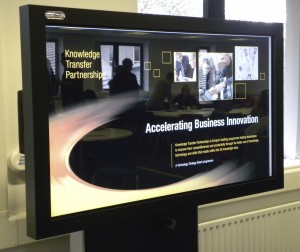 variety of funded initiatives on offer to help businesses develop and grow, but many are not aware of these offers, or just how much BU can help them with their development.
variety of funded initiatives on offer to help businesses develop and grow, but many are not aware of these offers, or just how much BU can help them with their development.
This is why we felt it was important to organise the recent KTP and SMART award events, to help promote and encourage businesses to take advantage of the expertise BU has to offer.
Both events were well attended by businesses and academics wanting to find out more on Knowledge Transfer Partnerships, SMART Awards and Innovation Vouchers. The feedback was extremely positive from all those who attended, and as a result a number of meetings have been arranged with businesses who are keen to 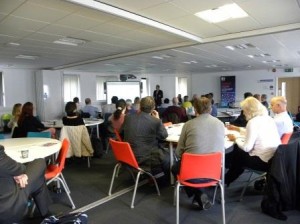 discuss how BU can help them develop!
discuss how BU can help them develop!
It was fantastic to receive such positive feedback; one business owner was particularly impressed and commented:
“I go to quite a few so called “Business Events” that serve little purpose, so I approached today’s event at BU a little circumspect. Now I can say that this morning I have attended the best business focused event in my recent experience. Extremely informative, very professionally managed and a great breakfast. A big thank you for showing the way that Academia and business can and should complement each other.”
Roger Allen – Managing Director, Zeta Commerce Ltd
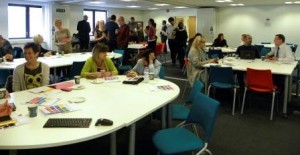
Should you wish to find out more on how businesses can benefit from any of the funded initiatives spoken about at the events, please contact Lucy Rossiter, email or call 01202 961215.
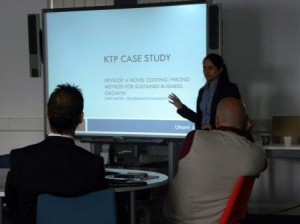

I just learnt the other day of an excellent example of some modest impact, which really made me feel that my work was worthwhile. It is so exciting when a student takes some theory and puts it into practice – successfully!
A few years ago I started researching menu description and menu engineering (publishing in the International Journal of Contemporary Hospitality Management), where I found that consumers are increasingly anxious to know where products have come from and how they are produced, satisfying the current “nostalgia” climate, which reminds of a time when “real”, “healthy”, “authentic”, “traceable” and “wholesome” were associated with food. I shared this information with participants on the School of Tourism CPD course and immediately Ben from The Drax Arms in Bere Regis put this theory into practice. Instead of sourcing his lamb for lamb burgers from a major supplier he made contact with his local farmer – wrote a story about this for his consumers to read and the burgers are now in his words ‘flying off the menu’. Based on the experience he is now actively sourcing other promising alliances.
This is a brilliant example of where research has impinged on practice and demonstrates the potential influential partnership between academics and the local business community.
Footnote:
Ben Holden, licensee of the Drax Arms is sponsored by regional brewer and pub operator Hall & Woodhouse Ltd. The CPD programme that Hall & Woodhouse students follow is designed to develop management and leadership skills consistent with the needs of a very dynamic and competitive brewing and pub operating industry. Upon completing the programme, students achieve a Certificate in Higher Education in Hospitality and Business Management and then progress to a Foundation degree as part of their ongoing personal development. For further information on School of Tourism CPD provision, contact Keith Hayman, (Head of CPD) khayman@bournemouth.ac.uk .

Meet your Food – Drax Arms
Drax Arms are proud to be supporting local Dorset farmers and being that the Lamb for our Burgers are farmed 6.6 miles away, we thought we would share the secrets as to why Dorset Lamb is the best tasting in the world.
Sarah Clarke of Fishmore Hill Farm says our Dorset Lamb is especially good which we attribute to being able to enjoy a natural lifestyle grazing on the down land.
You can find out more information about the farm and also the picturesque surroundings for their B & B by visiting Fishmore Hill Farm.